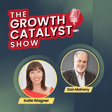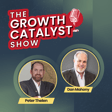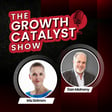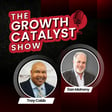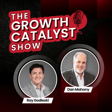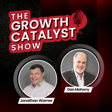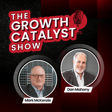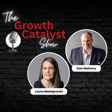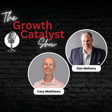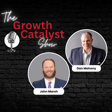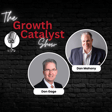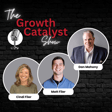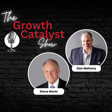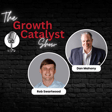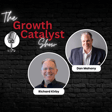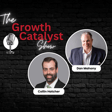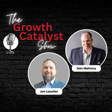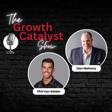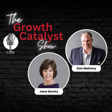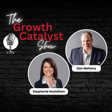Become a Creator today!Start creating today - Share your story with the world!
Start for free
00:00:00
00:00:01

The Concierge Touch: Exploring Family Offices with Andrew Windham
Gain insights into family offices with Andrew Windham from Educated Freedom, as he elaborates on the advantages of concierge financial management for entrepreneurs. Listen to a meaningful conversation that emphasizes the seamless integration of family office services and bespoke concierge strategies, fostering enduring success and growth.
Transcript
Introduction to The Growth Catalyst Show
00:00:00
Speaker
Welcome to The Growth Catalyst Show where we believe that growth can come in many forms, professional, personal, company, sales, you name it.
Empowering Growth with Dan Mahoney
00:00:08
Speaker
I'm your host, Dan Mahoney, founder of Transcendent Sales Solutions and a guide to a world of growth possibilities. I've spent my career empowering companies and their people with strategies that accelerate growth.
00:00:18
Speaker
I'm here to bring you stories of these business leaders and their trusted advisors to gain insights into their journeys and learn how they fueled their own growth. Just maybe their journey could become part of your own growth story.
Financial Freedom with Andrew Windham
00:00:30
Speaker
Are you ready? Let's grow.
00:00:34
Speaker
Welcome to the next edition of the growth catalyst show. I'm your host, Dan Mahoney. I am very excited to have our next guest. Andrew Windham is a family CFO speaker and coach at educated freedom, a concierge multifamily office for faith forward proven driven legacy committed entrepreneur founders. They provide freedom for founders by integrating every aspect of their personal and business finances through a proactive holistic and comprehensive and comprehensive wealth management. Andrew, welcome to the Growth Catalyst Show. Austin will be here, man. Buddy, we've been trying to do this for a while. We finally made it happen.
00:01:13
Speaker
It's all perfect timing.
Growing Up and Local Influence in a Dry County
00:01:14
Speaker
Perfect timing. Timing is always good. So as I was learning, as I do research for this show, which is favorite, was one of my favorite parts. I always learned something new about everybody. So, so Andrew is, is from Colum, Alabama. Is that where you grew up? That's where you grew up. I didn't even know. I didn't even know where the hell Coleman was until I went and looked it up on a map.
00:01:40
Speaker
So, um, well, growing up, we were no most notably for being a ah dry County where everybody drove to the nearest, uh, County 30 minutes or whatever to buy their beer, their, their adult alcohol, and then, uh, hopefully not imbibe it on the way the way back. Um,
00:01:59
Speaker
So literally prohibition, a prohibition
Unique Educational Background and Medicine Aspirations
00:02:02
Speaker
county. And what was really funny is um it came up for votes several times growing up and it came out that like one of the owners of like a big store was funding half the campaign because if we went wet, he was going to lose like probably take a 30% hit to his his bottom line or in your world, sales were going to go down. so
00:02:25
Speaker
Follow the money, right? So you had to drive a long way for spirits when you were in high school. Yeah. Yeah. Oh my God. That is hilarious. That I didn't read in your bio. So, and that explains to me why you went to Auburn and I understood now, you know, going to Auburn. Interesting. It's your background is your degree is business administration, P medicine, pre-medicine marketing and zoology. So what were you thinking? Like that's a mixed bag. Like I've never seen for an undergrad and a lot of minors. So what were you thinking?
00:02:59
Speaker
So, you know, it's interesting. I think I'll start in reverse at right after um I graduated and I moved to Atlanta. I'm really the first big boy job out of college working for vinegar group, which is like champs and footlocker and all of those. Um, another story for another day, but you know, people be like, you know, well,
00:03:22
Speaker
What'd you major in? And I was like, you know, marketing and zoology. And at and at the time the Atlanta zoo had just gotten the pandas and they were putting up the billboards, right? And I was like, Oh, I mean, I'm, I'm marketing for the zoo. And they're like, really no kid. And I was like, no, I'm just kidding. Um, but the brief story behind that is just basically, you know, uh, I ran in college at Auburn. Um, and, uh,
00:03:48
Speaker
I wanted to go to med school. My dad's a general surgeon or or as a retired general surgeon now. And um I wanted to go into orthopedic surgery.
Transition from Medicine to Entrepreneurship
00:03:56
Speaker
I'd spent two weeks plus in 20 something different specialties of medicine really leveraged my dad's relationships and connections and, and, um, spent a year and a half in high school through college working with an orthopedic surgeon. So I was, I was dialed in. That's what I wanted to do. Right. Um, and,
00:04:18
Speaker
You know, we've got all kinds of politics, the yeah whatever you want to call it, don't really want to feed that monster. but But back then, there were some quotas and some things with an agenda to make sure there was some more equal opportunity for admission. And if you were a white male, it took a it took a dang near perfect 4.0 and a 27.
00:04:39
Speaker
not to get in on the MCAT, but to get an interview. So my dad went to UAB, I got that complimentary interview coming out of that, you know, highly competitive. um I was irritated because I saw folks who hadn't put in the time and the work that were getting admissions and not me, um which is what led me in another way from medicine, which now I don't regret.
Founding of College Planning Institute
00:05:02
Speaker
um But Zoology was the only major that I could take and meet those pre-med requirements to get into med school and not have to like do chemistry or physics or math or do some research project for the, for the professor. So, you know, we went out to the stream and we did some ecology and snail research and you know, all those exciting things. And,
00:05:30
Speaker
Through the work in and experiences in medicine, I found a lot of healthcare care professionals are great at what they do, but they suck at running a business. And so I wanted to make sure I shored up some business skills. And so I was going to get a minor and it turned into a major because I had been misadvised. And so I ended up with a double major in marketing and zoology. So more than you wanted to know, but you know,
00:05:55
Speaker
We're a product of our experiences. Well, and it pivots very well as I'm going to jump right to, you talked about that college of mission and on a heart it was, you actually took that and turned that into what I think is your first business, your first business venture, which is the college planning Institute, correct? Well, so my first business venture was actually in insurance Georgia. Um, but, but yes, um, what I would call my first real business venture was college planning Institute because In, in, in the insurance world, I knew what I didn't want to do, which was not like, have to manage all the payroll and all that. So I negotiated and built that organization. So somebody else was doing all that work. Right. When, when I started building college planning Institute, I was like, whoa, this is a whole nother animal. Like I really have to do all the marketing, all the HR, like.
00:06:49
Speaker
all the everything, right? That so many business owners and entrepreneurs find out like, ooh, I bit off a little bit larger um piece of the elephant than I have the capability or skills to chew, right?
00:07:05
Speaker
So with educated freedom, you ran that business for 14 years and you, I can't imagine how many lives you've helped change, you know, you know, now probably some of the leaders in this country and helping them with those college choices. Well, so the way that I actually got into the college planning world,
00:07:27
Speaker
more or less ah Dan was the affordable care act got passed and my cheese didn't get moved. It evaporated overnight. Right. And so it, uh, in my, you know, mid late twenties, I was making a solid deep six figures and coat, you know, in, in, in my words, live in the American dream, Cindy Filer, one of your, your previous guests,
00:07:52
Speaker
I was in a small group with her and her husband and I remember thinking, man, these poor guys at 40 something, they're just now figuring it out. I'm so lucky at 24, 25, I've got the cat by the tail. you know Man, the Lord has just laughed at me over the last 30 years at that.
00:08:10
Speaker
but um I wanted to do something where I felt like I could make a difference. Um, and, uh, and so it was, you know, it was going the opposite way from trying to teach an old dog new tricks and making an impact at the, at the, uh, at the level with kids that were more coachable, teachable and helping them avoid some mistakes, if you will. And, um,
00:08:35
Speaker
So that's kind of where, where, where the idea and the concept showed up of just creating competitive leverage for a kid in the college process and really just flipping on its head, not who do I have to be to get into UGA, for example. Um, but is, you know, if I'm going to do engineering as UGA, even though they have engineering as a major, does that make sense? Right? We wouldn't go shop for groceries at Home Depot. And so, yeah, that was,
00:09:04
Speaker
a ton of fun for 14 years. And COVID ended up kind of being a pivot point to something
Pivot to Educated Freedom during COVID
00:09:10
Speaker
different. But prior to that, I've saved millions of dollars and college is and continues to be especially with the rate of cost growth. It's the largest cash flow event um in a student in a family's life per kid that can be a seven-figure wealth transfer if not done well and done right. So crazy impact on both negative and positive um generationally sometimes based off how we handle that. I think people don't don't know or appreciate. I really want to dig into educated freedom, but before I do that, I really want to understand from you as a successful entrepreneur has done multiple business. What are some things you learned along the way from as a business owner?
00:09:53
Speaker
So um I'm going to go right back to COVID. um I think COVID for some people, I had a mentor that said COVID was God's way of sending this to art to our room for a time out. and And some folks thought and learned and some folks um did alcohol or whatever else and and avoided the pain and suffering. um It was the pivot point from college planning to educated freedom.
00:10:17
Speaker
um But during that time, my podcast came out, Educated Freedom, Culture Career, Cash Flow. And in the prep for for the intro and all those things, I actually discovered my why, which is to help um people live their highest purpose all day, every day in every role that they play. And that has evolved. What his educated freedom in the family office is really precipitated, um Dan, is
00:10:48
Speaker
Um, really my own personal development journey and and growth and maturing, which there's brother, there's a lot more of that to go. Um, time willing from the Lord, but like I grew up watching my dad, for instance.
00:11:04
Speaker
Uh, who was a successful surgeon and business owner, but I saw all kinds of stress and headache and time loss because the way he did it, like trying to be the captain of all the things that he was doing, um, at the expense of him not being around growing up a lot. And so I wanted to do, I wanted to do that different, right? Um, I saw college planning and, and a problem I was going to have to face as a parent.
00:11:30
Speaker
So how could I learn that and then I just turn it into a business for a couple years and so I think the entrepreneurial journey is about discovery and what I've really learned social media and podcast are so helpful for Dan as you know is It's a way just to show up, not like a artificial way to like show up and be something. It's like, Hey, um, just show up authentically. And this is what I'm learning. What are you learning? And and you actually build authentic community through those types of of dialogues, questions, and, and posts, right?
Understanding and Benefits of a Family Office
00:12:06
Speaker
Amen. Amen. And you know, and that's, I love doing the show and I don't talk anything about my profession. I learned, this is a learning thing for me.
00:12:14
Speaker
And I hear what you're saying, you know, let's talk about family office. Cause I know there's a lot of folks that don't know what a family office is. I know what's one. And I knew about it with, you know, the billionaires of the world have their family investment offices. And so explain to me and explain to our, to our listeners, what a family office is. Well, so first of all, um,
00:12:40
Speaker
In its simplest form, a family office is actually a second business um that a high ultra high net worth family would have.
00:12:52
Speaker
think sports organization owners like an Arthur Blanca, the Falcons, etc. They literally have a full functioning business that represents and integrates all personal and in business um wealth wealth items. That could be real estate, tax services, lifestyle management, as simple as paying the bills.
00:13:13
Speaker
investment management, integrating all those things and basically just having a true pure fiduciary focus, meaning what's in that family's best interest. And if the people in that business serving the financial goals and interest of that person, you know, if they're not doing what they're supposed to do, they're gone.
00:13:35
Speaker
right? But it takes $400 million dollars minimum assets by and large for most folks to make that a break even or profitable scenario. And there's a huge proportion of the population specifically entrepreneurs, five to, you know, 150, 200 million that are bottlenecked, because as they grow their wealth,
00:13:59
Speaker
They get wealth in financial decisions in multiple lanes, and they don't know what they don't know. They have blind spots. And as we say, the more money that you have, the more attractive you are to people, pitches, and you know projects that look and feel good. son Shiny object syndrome, right?
00:14:18
Speaker
So if you look at, and that's a great, that that's a great explanation. So, you know, thinking as a business owner, and again, I'm not at that, I'm not at that 5 million to 150 million yet, but how does a business owner come to realization? Like, you know, I could use something like, cause I'm sure they're not going out and Googling family office services, right? So how did they come to the realization? Like I need this or I might be the benefit of this.
00:14:45
Speaker
Let's take a moment for a quick word from our sponsor. This episode of The Growth Catalyst Show was brought to you by Transcendent Sales Solutions. Whether your company is facing uncertainty, declining sales, or resource limitations, Transcendent Sales has the solution. Their team has decades of experience helping businesses find alignment to meet their growth goals and transforming underperforming sales organizations into revenue producing market leaders.
00:15:09
Speaker
They take a hands-on, results-oriented approach to solving sales challenges. Visit TranscendenceSales.com to learn more and subscribe to the biweekly Growth Catalyst newsletter for insightful growth strategies. Transcendence Sales Solutions, empowering businesses to reach new heights. And now, back to the show. So first of all, I want to clarify, we've established that we want to work with founders only um at 5-minute revenue and up.
00:15:36
Speaker
but Um, where it makes sense can really depend on the individual, their mindset in those types of things. So if you had somebody in the retail business, uh, as you know, Dan, and they're doing 5 million in revenue, they might be lucky for a 10% profit margin, you know, half a million dollars. If they're lucky once everything, you know, settles out where somebody in professional services or consulting a million dollars might have a higher profit margin B seven 50, right? So Yeah, yeah. So, but but anyhow, um it's it's really a function of a couple of things. It's a who not how, which is kind of the popular verbiage. And, you know, another popular ah theme right now is 10Xing. Don't 2X 10X, right? And what I would say is,
00:16:27
Speaker
If you want a 10X, then you're not going to solve your existing challenges and problems the way you thought about them before. You actually need paradigm shifts and to look and and manage things differently, right? And so the whole function of who, not how, and I think what what happens by time constraint for business owners as you grow is a lot of times we grow a business around our ego and um where where we're the center of everything. But then we realize, wait, like I'm missing out on the whole reason I built a business, which was to have freedom, to do what I want, when I want, with who I want, how I want, right? And so then you go, okay, so this isn't working to get what I wanted.
00:17:07
Speaker
I'm going to have to add a team, which means we have to grow skills, right? But then you realize, like, every time you grow the business, you think, well, this, the problems will go away. The problems don't go away. They get bigger. And what I would say is you have to choose which ones you have the time, the skills and the interest to solve. Most business owners, entrepreneurs, they're exceptional at creating wealth, but they're even more talented and capable, ah capable.
00:17:37
Speaker
of giving it away because they have what we call transferred or unearned confidence. I saw this with my dad, great surgeon, your life's on the line. You want that guy operating on you. You're doing something outside of what he does every day and gets reps. Eh, maybe not so much, but that confidence he had in the operating room, he would transfer and get himself in a little bit of trouble from time to time, unknowingly and unnecessarily. So if you were, if if it's, I'm going to put myself in a, in that founder's shoes, you know, and I'm working with you, what are some things that you're going to be able to help me with and drill down. And so just understand what that means.
00:18:24
Speaker
Yeah, so like the traditional family office, but in a more efficient manner using technology, flexibility, scalability, high net worth or even successful founders studies show that, um, they don't need or want or have the time to travel or meet with their advisors in person and COVID force people to embrace technology just like we can record podcasts via zoom and all those things versus having to physically be there. Right. So the first thing is they know that they want a plus
00:18:59
Speaker
um subject matter experts right number two um they want to have a relationship but really they don't want the relationship around the numbers they want it to be personal just like because we do business with people that we know like and trust that requires depth and breadth of relationship usually overtime or through experiences right and so when When everything doesn't have to be locale, you can use the best subject matter expert anywhere in the in you know the continental US, s for example, and that raises the game. so
00:19:36
Speaker
business owners, um often their number one expense is taxes. I've never met him anybody that said, Oh yeah, I love, you know, giving a million dollars to the government. Right. And so that might be the pain or the significant financial issue that they're experiencing, but they, they, um, because what they really want is they really just want to reduce the tax bill.
00:20:00
Speaker
Right. So I had a dentist like he'd been to a seminar and he just wanted to buy a hundred houses a year. If that's what it took to drive his tax bill to zero. Okay. But he's not thinking about like, what do you know about real estate? Who's managing the houses? When you sell them, what happens to the taxes? Like all of those things, he was focused on the hole that he wanted from the drill, not the management and what it took to run the drill. Right. So,
00:20:28
Speaker
We hire, coordinate and synergize all of those subject matter experts so that the business owner spends 20 hours or less a year simply making decisions. And then we manage all of the execution transparently and holistically on their behalf.
00:20:47
Speaker
So an example is we gave a business owner who was hoping not to be in their business 40 hours day to day by 67 in two and a half years, $3.2 million dollars of tax savings and the realization that he could exit his business.
00:21:04
Speaker
10 years quicker. So we gave him a decade of freedom back in his life. And he gets to get to that, what we would call second half or last best chapter of his life, which is living and enjoying the discretion of time, which is the greatest, um, I think display of, of our example of wealth, right?
00:21:25
Speaker
Interesting. So, you know, again, you gave that example definitely with taxes, but then like, Hey, like, Hey, I'm a business owner. I'm thinking all the things I need to do right now. I need to get better. I need to renegotiate insurance. I need to refinance a couple of things on the personal end. I'd love to look for commercial property, that type of thing. So you can help coordinate all that stuff on the personal and professional side.
00:21:48
Speaker
Correct. So we take complex financial decisions and we make them simple by making sure that the business owner is very clear on what it is they want the end result to be. And then they likely don't understand the complexity that goes into that. So two quick examples, buying a car seems simple enough. yeah On average, low end is a six day, a six hour process. If everything's perfect when you get there.
00:22:15
Speaker
It could take as long as six weeks plus. What are the elements of that? it's Know what you want. source the car, negotiate the cost, financing, which could be self-financing with cash or financing with somebody else's money. What's the best outcome? There's insurance, there's titling, all of those things. So really five components and three to four professionals that have some impact on finance. And we don't think of it like that because we do it one or two times every four to five years.
00:22:50
Speaker
We do that for a business owner so that they have 15 to 20 minutes total and it's delivered concierge to their drive. And is one testimonial of our client is I got to go drink beer and play golf with my friends um while he did all the hard work. Right. And so they loved it. But to your example,
00:23:11
Speaker
financing like real estate. So we're working with a ah dentist right now out of Nashville that almost made a bad decision on a 4.8 million dollar loom.
00:23:23
Speaker
And he spent four months almost making a mistake that would haunt him for at least seven years because of a seven-year prepayment penalty. Conversely, with a client that we've been working with for a year, we bought, financed, and closed on a commercial office space with three partners in three weeks. What's the difference?
00:23:44
Speaker
Having the the knowledge and knowing who you need, what you need to show up. So when we hit the go button, everything is just execution and managing the process. And that's what we that's what we do on behalf of business owners in every significant or meaningful financial decision, opportunity, or moment of stress.
00:24:08
Speaker
You just gave a bunch of examples of the financial impacts of working for you, working with you, but I can only imagine just the impacts in general on their lives as far as balance, because as an entrepreneur and you know it, you and I have talked about how struggle it is sometimes is finding that balance. Talk about some of the successes on that end, because I'm sure they're they're vast and endless.
00:24:31
Speaker
Honestly, the the greatest emotional paycheck for me is seeing business owners who have sacrificed for years. They finally get over the hump, but they're kind of stuck and frustrated with a bottleneck. We find this all the time with business owners who hire fractional C-level execs to kind of work through a deal. But then they their thought is like with a fractional CMO,
00:24:54
Speaker
I'll hire them to do that they pay them thirty fifty thousand dollars a year but what the fractional CMO says is. You don't have an integrated plan for marketing brand management although some of the need another sixty to do that. And so now the business owner is you could imagine dance light will wait a second.
00:25:13
Speaker
that dream cruise over to Tahiti and Bora Bora, now I'm not gonna be able to do that because, or I'm gonna have to sacrifice that or delay it because I need the money or a portion of it to do this thing that I hired the the fractional CMO, right? And so when we're working with a business owner, one, we give them time, but two, we see opportunities that they don't even know we're there. And so in doing that, we free up the cashflow and they get to do More of all of that they blow through a a bottleneck and then their business grows, you know yet again That means more tax liability, which is a full net problem. But then we have solutions for that
00:25:57
Speaker
But all that to say the cool part is watching the business owner have breakthroughs personally and professionally that then allow them to really get to the whole reason they started in the first place to make impact and to do awesome things for people that they know they love and that they care about.
Outsourcing Financial Tasks for Founders
00:26:14
Speaker
So a founders out couple founders out here listening. What are a couple of things they should be thinking about now as far as moving towards something to give them more freedom?
00:26:26
Speaker
So very often, um, I use the analogy of, um, two extremes. You got the do it yourself first. Home Depot made that kind of popular. You can do it. We can help, right? But, um, can you do it yourself? The answer is yes. Like the, but the dentist trying to refinance his is his deal, right?
00:26:48
Speaker
But when we got involved and hit the stop button is cash flows gonna be nineteen thousand dollars better with our help cuz we do it better in more times and more efficiently. And you'll have one tenth of the time if even that involved in the whole process so.
00:27:08
Speaker
you know Often what happens is we get bad results like hiring people because we didn't do the work and we don't know what we don't know. We can be that trust most trusted advisor for a founder that every time you have a significant decision or financial decision, we can make sure we're looking at all the options and we're we're holding transparency um and conflicts of interest right out in front. So it's a fully formed holistic you know, decision. So you got tons of things, you know, you want to do and you need to do, whether it's financially or otherwise, but you have a limitation of time. Most folks don't understand how much time in emotional distraction they're using around financial things.
00:27:56
Speaker
trying to figure out how to pay for a kid to go to college or which college to go to, buy a car, sell a house. I'd love to get my second home, but in their mind, they think they have to have cash for whatever reason. And they've got the cash on hand to control that experience and do it sooner than later. So they create the experiences when their kids are in the house versus when their kids go to college and are wanting to do and and and be their own life. It's just about,
00:28:26
Speaker
Um, time freedom is, is the biggest um thing we get back over and over and over again. Um, and the number one thing we hear is like, this sounds awesome, but I'm not sure I can afford it or I'll get the return on investment. And here's what I'll tell you. Um, I'm usually shocked if within the first year, they're not getting a 15 to 20 X return.
00:28:55
Speaker
in terms of value both from time and money from from what they're doing,
Contact Information and Closing Encouragement
00:29:00
Speaker
right? Well, and the time is the in the time is the thing we never have enough of and we could never get back. Yep. Andrew, this has been a great conversation with you. Last question, if someone's interested to learn more about educated freedom, what's the best way to get in touch with you and learn more?
00:29:19
Speaker
so um Two answers to that. Number one, we've got an assessment um that we've just set that maybe they don't want to work with us, but they want to just do a quick um you know mental check of areas they may be missing or they want to improve. um And they may have somebody that does similar to what we do. That's awesome. We just want them to get better. We have an assessment they can do they can just DM me on um Educated Freedom um or send me an email andrew at educatedfreedom.com and we'll send that over. um Or um I've got a link in my in my um podcast show notes that has that in there. So love to do that. um If you're interested or you have a significant financial issue or you just want to set up a consultation, just reach out or call the office at 678-585-00.
00:30:11
Speaker
We'll set up 15, 20 minutes, chat and see where you're at. See if it makes sense to have a further conversation. If not, you'll have some ideas that that'll help you move things forward. And like you do the podcast, we just love getting to hear founder's stories. um We just think that's magical.
00:30:31
Speaker
absolutely well and your story was magical in hearing how you started. Congratulations on your success and what you do and thank you for taking some time to come on the Growth Catalyst show today.
00:30:55
Speaker
forward to our next journey together. If you've enjoyed the show, please subscribe and leave a review. Until next time, keep growing.
